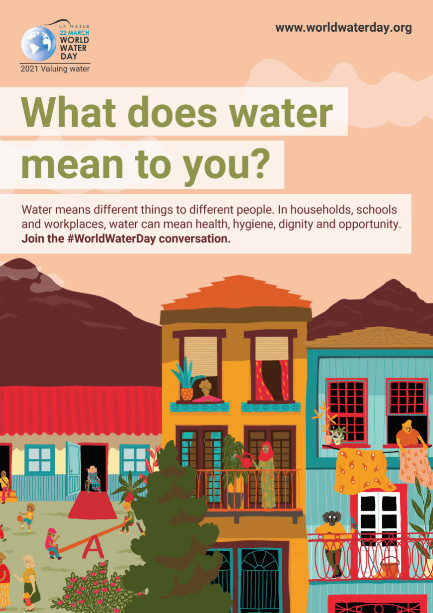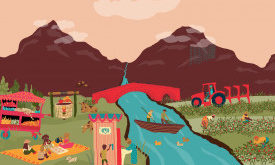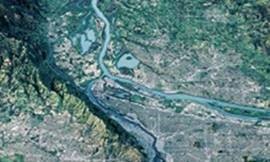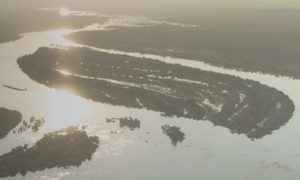Nouvelle
World Water Day 2021
About
World Water Day is celebrated each year on 22 March. It aims to raise awareness of the 2.2 billion people living without access to safe water. It is about taking action to tackle the global water crisis. A core focus of World Water Day is to support the achievement of Sustainable Development Goal 6: water and sanitation for all by 2030.
Today, water is under extreme threat from a growing population, increasing demands of agriculture and industry, and the worsening impacts of climate change. As societies balance the demands on water resources, many people’s interests are not being taken into account.

2021 Theme
“Valuing water” is the theme for World Water Day 2021. Economic development and a growing global population means agriculture and industry are getting thirstier and water-intensive energy generation is rising to meet demand. Climate change is making water more erratic and contributing to pollution.
As societies balance the demands on water resources, many people’s interests are not being taken into account.
How we value water determines how water is managed and shared. The value of water is about much more than its price – water has enormous and complex value for our households, culture, health, education, economics and the integrity of our natural environment.
If we overlook any of these values, we risk mismanaging this finite, irreplaceable resource.
Valuing Water Sources – Natural Water Resources and Ecosystems
All water is generated by ecosystems. And all the water we abstract for human use eventually returns to the environment, along with any contaminants we have added. The water cycle is our most important ‘ecosystem service’. Higher value must be given to protecting the environment to ensure a good quality water supply and build resilience to shocks such as flood and drought.
Valuing Water Infrastructure – Storage, Treatment and Supply
Water infrastructure stores and moves water to where it is most needed, and helps clean and return it to nature after human use. Where this infrastructure is inadequate, socio-economic development is undermined and ecosystems endangered. Typical valuations of water infrastructure tend to underestimate or not include costs, particularly social and environmental costs. It is difficult to recover all costs from tariffs (known as full cost recovery). In many countries, only part or all of the operational costs are recovered, and capital investments are covered by public funds.
Valuing Water Services – Drinking Water, Sanitation and Health Services
The role of water in households, schools, workplaces and health care facilities is critical. Furthermore, WASH – water, sanitation and hygiene – services also adds value in the form of greater health, particularly in the context of the COVID-19 pandemic. WASH services are often subsidized, even in high-income countries. However, untargeted subsidies can benefit people with existing water connections, rather than improving the situation for poor and underserved communities.
Valuing Water as an Input to Production and Socio-Economic Activity – Food and Agriculture, Energy and Industry, Business and Employment
Agriculture places the biggest demand on global freshwater resources and is a major contributor to environmental degradation. Despite being fundamental to food security, water in food production is generally given a low value when assessed purely through the economic lens of value produced in relation to water used. Many of the wider benefits – improving nutrition, generating income, adapting to climate change and reducing migration – are often not reflected in the cost of water. For the energy, industry and business (EIB) sector, water-related threats such as water scarcity, flooding and climate change can push up costs and disrupt supply chains. Corporate mismanagement of water can damage ecosystems and harm reputations and affect sales.
Traditionally, the EIB sector has valued water by the volume used, plus the costs of wastewater treatment and disposal. More organizations are adopting integrated water resource management (IWRM) planning approaches as they improve their sustainability.
Valuing Socio-Cultural Aspects of Water – Recreational, Cultural and Spiritual Attributes
Water can connect us with notions of creation, religion and community. And water in natural spaces can help us feel at peace. Water is an intrinsic part of every culture but the values we attribute to these functions are difficult to quantify or articulate. Economics often considers water to be a resource for practical human usage and pays little or no attention to its socio-cultural, or environmental, value. There is a need to fully understand cultural values around water by involving a more diverse group of stakeholders in water resources management.
Importance of Water
Water is complex because it is linked to almost everything in the world. But complexity should not hinder understanding: Water is a precondition for human existence and for the sustainability of the planet.
Water is at the core of sustainable development and is critical for socio-economic development, healthy ecosystems and for human survival itself. It is vital for reducing the global burden of disease and improving the health, welfare and productivity of populations.
Water is also at the heart of adaptation to climate change, serving as the crucial link between the climate system, human society and the environment. Without proper water governance, there is likely to be increased competition for water between sectors and an escalation of water crises of various kinds, triggering emergencies in a range of water-dependent sectors.
The physical world of water is closely bound up with the socio-political world, with water often a key factor in managing risks such as famine, epidemics, inequalities and political instability.
According to the UN, today, one in three people live without safe drinking water. By 2050, up to 5.7 billion people could be living in areas where water is scarce for at least one month a year. Climate-resilient water supply and sanitation could save the lives of more than 360,000 infants every year and if we limit global warming to 1.5°C above pre-industrial levels, we could cut climate-induced water stress by up to 50%.
Extreme weather has caused more than 90% of major disasters over the last decade and by 2040, global energy demand is projected to increase by over 25% and water demand is expected to increase by more than 50%.
Sustainable Development Goal 6 on Water and Sanitation (SDG 6)
SDG 6 seeks to ensure safe drinking water and sanitation for all, focusing on the sustainable management of water resources, wastewater and ecosystems, and acknowledging the importance of an enabling environment. In the 2030 Agenda for Sustainable Development, countries have committed to engage in systematic follow-up and review of progress towards the Goals and targets, using a set of global indicators. The UN Water SDG Portal tracks the progress of SDG 6.
UN Environment Programme (UNEP)’s data indicates that the world is not on track to achieve sustainable water management by 2030 and efforts would have to double over the next nine years to achieve Sustainable Development Goal (SDG) 6 – which calls for “the availability and sustainable management of water and sanitation for all.”
On 18 March 2021, a new Water and Climate Coalition was launched to speed up lagging progress towards the water-related Sustainable Development Goals (SDGs) and in particular SDG6 on clean water and sanitation for all. The coalition aims to achieve more effective integrated policy-making in an era when climate change, environmental degradation and population growth has exacerbated water-related hazards and scarcity. More information.


Hand Hygiene and COVID-19
Hand hygiene saves lives. To contain the spread of COVID-19 and many other infectious diseases, it is critically important to clean your hands regularly with water and soap or alcohol-based hand rub.
On this World Water Day, and any other day, remember to wash your hands regularly with water and soap or with an alcohol-based hand gel.

- Infographic: World Health Organization (WHO)
Water, Sanitation and Hygiene (WASH) for All Initiative
The core activity of WASH emphasizes the teaching of basic sanitation and hygiene to communities and school children with a particular focus on girls’ education and gender equality, as a necessary complement to the success of water and sanitation infrastructure projects.
This integrated approach to the delivery of basic services is the product of “lessons learned” from the International Drinking Water Supply and Sanitation Decade (1981-1990). While advancements were made in increasing the access to safe drinking water, less progress was made on the provision of sanitation services and in hygiene education and training. These valuable lessons are now the focus of a global effort to improve the health and productivity of the urban and rural poor in the developing world.
The UNICEF office in Geneva operates as the Cluster Lead Agency for the Global WASH Cluster (GWC), the formal coordinating platform for humanitarian WASH actors in all parts of the sector. UN agencies in Geneva active in the cluster include the World Health Organization (WHO), the United Nations High Commissioner for Refugees (UNHCR), and the International Organization for Migration (IOM).
Many Geneva-based organizations in the humanitarian sector are actively engaging in WASH, including among others Care International, Helvetas, the International Committee of the Red Cross, the International Federation of Red Cross and Red Crescent Societies (IFRC), and Médecins sans Frontières. The International Association of Professionals in Humanitarian Assistance and Protection provides an overview of key references and actors in WASH.
Role of Geneva
International Geneva
Geneva and its surrounding area host important international organizations working on water, presented below by alphabetical order.
Convention on the Protection and Use of Transboundary Watercourses and International Lakes (Water Convention)
The Water Convention, administrated by UNECE, strengthens transboundary water cooperation and measures for the ecologically-sound management and protection of transboundary surface waters and groundwaters. The Convention fosters the implementation of integrated water resources management, in particular the basin approach. The Convention’s implementation contributes to the achievement of the Sustainable Development Goals (SDGs) and other international commitments on water, environment and sustainable development.
The Protocol on Water and Health, jointly serviced by UNECE and WHO-Europe , is a unique legally binding instrument aiming to protect human health by better water management and by reducing water-related diseases. The Protocol provides a practical framework to translate into practice the human rights to water and sanitation and to implement SDG 6.
Convention on Wetlands (Ramsar Convention)
The Convention on Wetlands (Ramsar Convention) is the intergovernmental treaty that provides the framework for the conservation and wise use of wetlands and their resources. Its mission is the conservation and wise use of all wetlands through local and national actions and international cooperation, as a contribution towards achieving sustainable development throughout the world.
Geneva Water Hub
The Geneva Water Hub is a center of excellence specialized in hydropolitics and hydrodiplomacy of the University of Geneva, as well as a joint project with the Swiss Confederation (Agency for Development and Cooperation, Global Programme Water Division).
International Rainwater Harvesting Alliance (IRHA)
The International Rainwater Harvesting Alliance (IRHA) was created in Geneva in November 2002 following recommendations formulated during the World Summit for Sustainable Development in Johannesburg two months earlier. The mandate called for the federation and unification of the disparate rainwater harvesting (RWH) movement around the world, to promote rainwater as a valuable water resource and to build on achievements in this field for the fulfillment of the Millennium Development Goals.
International Union for Conservation of Nature (IUCN) Global Water Programme
The IUCN Global Water Programme is a trusted partner for action and knowledge on sustainable water resource management. Bringing together an extensive network of IUCN Members, experts, government and private sector partners, its work focuses on promoting good water governance, implementing nature-based solutions for climate change adaptation, protecting freshwater biodiversity, and supporting increased investment in ecosystems as natural water infrastructure.
Sanitation & Hygiene Fund
The Water Supply and Sanitation Collaborative Council (WSSCC) is a global, multi-stakeholder membership and partnership organization that works with poor people, organizations, governments and local entrepreneurs to improve sanitation and hygiene at scale. To reach the SDG 6.2 target of safely managed sanitation, there is an urgent need to globally prioritize sanitation, hygiene and menstrual health. That is why WSSCC is evolving into the Sanitation and Hygiene Fund by 2021.
Toilet Board Coalition (TBC)
The Toilet Board Coalition (TBC) has the ambition to address the global sanitation crisis by accelerating the Sanitation Economy. The TBC is enabling private sector engagement; connecting large and small companies; and ensuring close collaboration between private, public and non-profit sectors with the common goal to achieve Sustainable Development Goal 6 (SDG6), universal access to sanitation. The TBC runs the Toilet Accelerator, the world’s 1st accelerator programme dedicated to sanitation entrepreneurs in low-income markets.
UN Water
As there is no single UN entity dedicated exclusively to water issues, UN Water coordinates with over 30 UN organizations that carry out water and sanitation programmes, reflecting the fact that water issues run through all of the UN’s main focus areas.
UN Special Rapporteur on the Human Rights to Safe Drinking Water and Sanitation
Pedro Arrojo-Agudo is the Special Rapporteur on the Human Rights to Safe Drinking Water and Sanitation. The was established to focus on the issue of human rights obligations related to access to safe drinking water and sanitation, carry out thematic research, undertake country missions, collect good practices, and work with development practitioners on the implementation of the rights to water and sanitation.
World Business Council for Sustainable Development (WBCSD)
The World Business Council for Sustainable Development (WBCSD) works on several projects on water such as valuing water, water stewardship and targets and circularity metrics. The Global Water Tool is also a tool developed jointly by WBCSD members and partners bringing global data on key water-related indicators, allowing companies to understand their risks and plan water management strategies. The tool was the first publicly available resource to be developed for identifying corporate water risks and opportunities, and since its launch in 2007 has supported several corporates to prioritize their water management actions across their global operations.
World Economic Forum (WEF)
The World Economic Forum (WEF) has a Strategic Intelligence that provides insights and contextual intelligence to explore and monitor the issues and forces driving transformational change across economies, industries, and global issues, among them, water.
World Meteorological Organization (WMO)
As a specialized agency of the United Nations, the World Meteorological Organization (WMO) is dedicated to international cooperation and coordination on the state and behavior of the Earth’s atmosphere, its interaction with the land and oceans, the weather and climate it produces, and the resulting distribution of water resources. The World Meteorological Congress has also defined eight long-term ambitions to address the water challenge before it becomes a crisis. In addition, the WMO is a member of the Water and Climate Coalition, aimed at strengthening operational capacities at national, regional and global level to address water related sustainable development and climate change adaptation challenge.
Local Geneva
Association pour la Sauvegarde du Léman (ASL)
The Association pour la Sauvegarde du Léman (ASL) is a Franco-Swiss association, of scientific reference, apolitical, non-profit and recognized as being of public utility. With around 4,000 members, the ASL was created in 1980 to safeguard the quality of the waters of the Lake Geneva basin, namely that of the rivers and Lake Geneva.
Canton of Geneva
The Office cantonal de l’eau (OCEau) contributes to providing a pleasant and safe living environment for the population by preserving, with its partners and in a cross-border dimension, the various water cycles and the services provided by aquatic ecosystems (lake and waterways).
Commission internationale pour la protection des eaux du Léman (CIPEL)
The Commission internationale pour la protection des eaux du Léman (CIPEL) conducts studies to maintain or restore an ecologically acceptable quality of the water and the aquatic environment as a whole such as the use of Lake Geneva’s water for drinking water after simple processing, the practice of leisure activities (fishing, swimming and other aquatic activities) under optimum conditions, and that the predominance of noble fish (Arctic charr, corregones (whitefish) or féra, and trout) is ensured by natural reproduction.
SIG – Eau de Genève
SIG is a public law institution governed by the Geneva Constitution, the Act on the Organisation of Public Law Institutions (LOIDP) and the Act on the Organisation of the Industrial Services of Geneva. On a daily basis, SIG provides essential services in Geneva, among them, water. Consumed by 93% of the cantonal population on a daily basis, the water in Geneva is local, ecological and of excellent quality. Its composition, varied in mineral salts, is comparable to some bottled waters.
Events

Celebration of World Water Day 2021 – Valuing Water
22 March 2021 | 13:00 CET | Online | UN Water

Water & Sanitation in the City | Good & bad experiences, what are the lessons?
22 March 2021 | 13.30 – 15.30 CET | Online | Geneva Cities Hub
Learning

Droit international de l’eau douce
22 March – 9 May 2021 | Online | Geneva Water Hub

Local Water Solutions for Global Challenges
22 March – 30 April 2021 | Online | UNITAR

MOOC - International Water Law
Online | Geneva Water Hub

MOOC - Water Resources Management and Policy
Online | Geneva Water Hub

MOOC - Climate and Water in Mountains: A Global Concern
Online | University of Geneva

MOOC - Governance for Transboundary Freshwater Security
Online | UNECE
Resources
- UN World Water Development Report | UN Water
- World Water Day | UN Water
- World Water Day | UN
- Summary Progress Update 2021: SDG 6 — Water and Sanitation for All | UN Water
- Progress on Integrated Water Resources Management: Global baseline for SDG 6 indicator 6.5.1 – Degree of IWRM implementation | UNEP
- Globally, 3 billion people at health risk due to scarce data on water quality | UNEP | 19 Mars 2021

